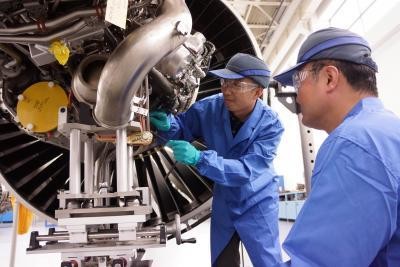Thu, Dec 07, 2023
NPRM Would Require Foreign Repair Stations to Implement Testing Program
The FAA wants certificated repair stations outside the USA to be held to the same standards as those inside it when their employees work on air carrier aircraft, according NPRM FAA-2012-1058.

The rule would align domestic and international maintenance facilities, ensuring that "employees are held to the same high level of safety standards regardless of where they are physically located," according to the FAA. At the moment, they say "few countries require testing of aviation or maintenance personnel," a discomfiting idea to those familiar with the much more stringent programs in place stateside.
The rule would require non-domestic certificated repair stations to give employees "all necessary anti-drug and alcohol training" and send their testing data electronically to the Department of Transportation." The rule would require Part 145 repair stations to meet the requirements of 49 CFR part 40 and 14 CFR part 120, just like any other employer whose personnel perform maintenance functions on part 121 carrier aircraft. If the station cannot meet one or all of the requirements, they may apply for an exemption using 49 CFR 40.7 or apply for a waiver for those unmet in part 120.
Additionally, the rule could push domestic 121 operators to hire maintainers abroad to cover them under their own existing programs. "When hiring by contract, if a part 145 domestic repair station does not have a testing program of its own, the part 121 operator must cover the repair station’s safety-sensitive employees under its FAA drug and alcohol testing program.2 In this scenario, for purposes of drug and alcohol testing, the part 121 operator hires the repair station employees as covered employees and must apply all the regulatory requirements of the program to these employees (e.g., conduct a pre-employment drug test, the records check, the training and educational information distribution requirements, and include the individuals in the random testing pool)."
The rule, if it goes into effect in its current form, would affect around 977 repair stations in at least 65 countries. It is scheduled for publication in the Federal Register on December 7th, 2023, and the public will have 60 days to submit comments.
More News
We're Everywhere... Thanks To You! Even with the vast resources and incredibly far-reaching scope of the Aero-News Network, every now and then a story that should be reported on sl>[...]
“The Coast Guard anticipates new aircraft procurements may be based off Sikorsky’s MH-60R aircraft, which is the maritime variant of the H-60 in active production. Diff>[...]
Aero Linx: Classic Jet Aircraft Association (CJAA) The CJAA Formation and Safety Team (FAST) Mission is to be the sole authorized provider of formation training and certification f>[...]
During A Low Pass Over A Gravel Bar, The Airplane’S Tailwheel Impacted An Area Of Rough, Uneven Terrain Analysis: The pilot reported that he was flying low-level over various>[...]
Hold For Release Used by ATC to delay an aircraft for traffic management reasons; i.e., weather, traffic volume, etc. Hold for release instructions (including departure delay infor>[...]
 ANN FAQ: How Do I Become A News Spy?
ANN FAQ: How Do I Become A News Spy? Aero-News: Quote of the Day (10.28.25)
Aero-News: Quote of the Day (10.28.25) ANN's Daily Aero-Linx (10.28.25)
ANN's Daily Aero-Linx (10.28.25) NTSB Final Report: Aviat Aircraft Inc A-1B
NTSB Final Report: Aviat Aircraft Inc A-1B ANN's Daily Aero-Term (10.28.25): Hold For Release
ANN's Daily Aero-Term (10.28.25): Hold For Release



